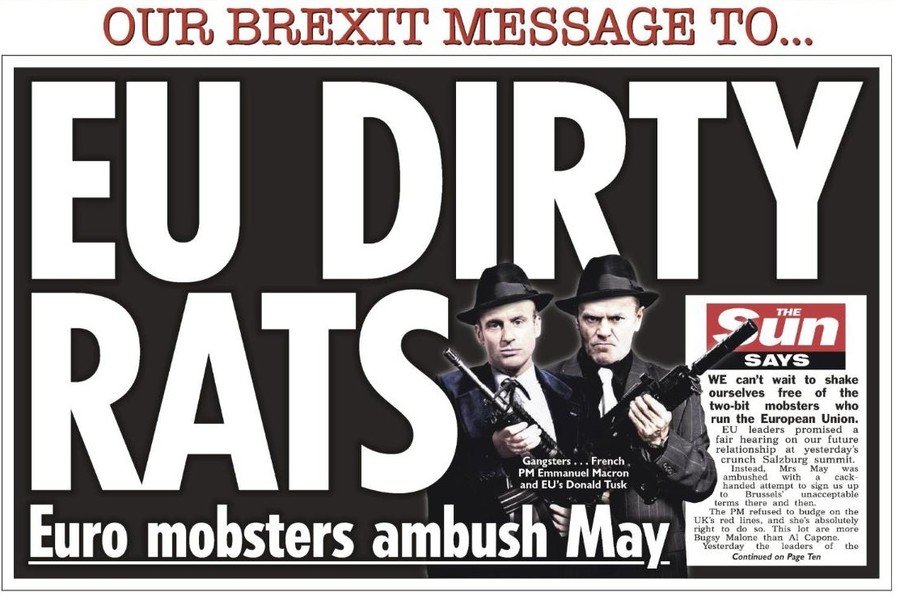First step to censorship? Brussels touts media regulation after Sun’s 'EU dirty rats' story
The European Union's move to target the media after The Sun's "EU dirty rats" story about the bloc's leaders is the first step on a "slippery" road to an assault on press freedom and "outright censorship," an expert told RT.
European Justice Commissioner Vera Jourova took a swipe at UK media in a speech at the Fundamental Rights Forum (FRF) in Vienna. She claimed that the Brexit debate in the UK has been tainted by vicious pro-Brexit British tabloids.
"Just last week, the EU leaders were called 'dirty rats' on [the] first page [of a British tabloid]," she stated, adding that almost daily one could find examples of similar stories "that are spiced up to point out the enemy" and "to paint the picture black and white."

Jourova also recalled a previous "first page of a popular British daily" – the Daily Mail – which called judges "the enemy of the people." The story from 2016 concentrated on 'out of touch' judges who ruled that Brexit could not be triggered without parliament's consent.
The top EU official assumed that she would advocate "for a European approach to media based on quality and smart regulation." According to Jourova, media can "spread disinformation and encourage exclusion." And the Brexit debate "is the best example of that," she concluded.
READ MORE: UK's May tells ministers to hold their nerve over Brexit
Gangsters, guns & 'dirty rats'
The much-discussed 'dirty rats' story published by The Sun in the wake of the recent Salzburg summit took aim at Donald Tusk and Emmanuel Macron. The presidents of the European Council and France were depicted in a mocked-up picture cast as American gangsters holding guns. The Sun explained that both Macron and Tusk "acted more like gangsters than politicians" while reacting to Brexit issues.
Back at the summit, Tusk said that May's Chequers plan "risks undermining the single market," while Macron insisted that Brexiteer politicians are "liars," who left the campaign the "next day" after the UK referendum. "We can't wait to shake ourselves free from the two-bit mobsters who run the European Union," The Sun concluded, referring to the above-mentioned politicians.
More tepid tabloid headlines included the The i's "Salzburg disaster," and "Furious May: We're ready to walk away" by the Daily Mail, as well as "Brexit: May humiliated by Salzburg ambush as she fights to save Chequers."
Brexit: May humiliated by Salzburg ambush as she fights to save Chequers https://t.co/rkGaDvCo3v
— Guardian news (@guardiannews) 21 сентября 2018 г.
READ MORE: UK PM May demands new proposals from EU to break ‘impasse’
'The first step of very slippery slope'
The decision by the European Commission to refer to regulation of the media and to openly criticize British tabloids may create "a very dangerous and totally totalitarian precedent," Neil Wallis, former News of the World deputy editor, told RT. The Commission "deciding how the news should be presented" is "the first step of a very slippery slope," he said.
According to the former newspaper editor, Jourova's statement may signal "a first step on the road of outright censorship." This may lead to "a serious attack on press freedom" and even "the death of free press," he concluded.
John Wight, a writer and political commentator, believes the EC proposals would be "impossible to implement," and would "only fuel support for Brexit."
READ MORE: EU’s Tusk delivers savage blow to Theresa May: Brexit plan ‘will not work’
In July this year, Theresa May managed to negotiate the controversial Brexit plan, which is also known as the Chequers deal, at a marathon session of talks with her cabinet. The strategy, which defines the relationship between the UK and the EU after Brexit, divided both politicians and the public. Former foreign secretary Boris Johnson, however, later said that the Brexit plan is "a suicide vest" wrapped around the British constitution, and the detonator has been handed to Brussels.












